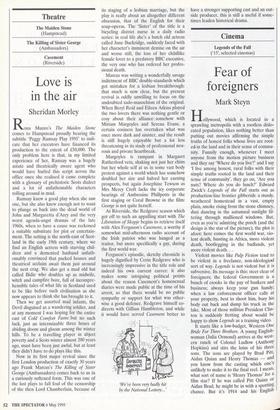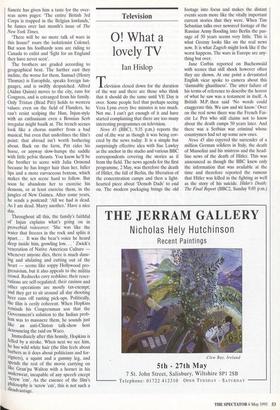Cinema
Legends of the Fall (`15' , selected cinemas)
Fear of foreigners
Mark Steyn
Hollywood, which is located in a sprawling metropolis with a rootless dislo- cated population, likes nothing better than putting out movies affirming the simple truths of honest folks whose lives are root- ed in the land and in their sense of commu- nity. Funnily enough, whenever I meet anyone from the motion picture business and they say 'Where do you live?' and I say `I live among honest, rural folks with their simple truths rooted in the land and their sense of community', they go on, 'Are you nuts? Where do you do lunch?' Edward Zwick's Legends of the Fall starts out as production-line frontier gibberish: a sturdy, weathered homestead in a vast, empty plain, smoke rising from the stone chimney, dust dancing in the autumnal sunlight fil- tering through mullioned windows. But, even as you're admiring the porch (and the design is the star of the picture), the plot is afoot: here comes the first world war, vio- lent death, hunting in Africa, more violent death, bootlegging in the badlands, yet more violent death.. .
Violent movies like Pulp Fiction tend to be violent in a freelance, non-ideological sort of way. Legends is not violent but it is subversive. Its message is this: steer clear of foreigners; the federal Government is a bunch of crooks in the pay of bankers and business; always keep your gun handy; when a law enforcement officer calls at your property, best to shoot him, bury his body out back and dump his truck in the lake. Most of those militias President Clin- ton is suddenly fretting about would be happy to show Legends as a training video. It starts like a low-budget, Western One Bride For Three Brothers. A young English- woman (Julia Ormond) arrives at the west- ern ranch of Colonel Ludlow (Anthony Hopkins) and stirs the loins of his three sons. The sons are played by Brad Pitt, Aidan Quinn and Henry Thomas — and you know from the casting which ones unlikely to make it to the final reel. I mean, what sort of name is 'Henry Thomas' for a film star? If he was called Pitt Quinn or Aidan Brad, he might be in with a sporting chance. But it's 1914 and his English fiancée has given him a taste for the over- seas news pages: 'The entire British 3rd Corps is trapped in the Belgian lowlands,' he fumes over last month's issue of The New York Times.
`There will be no more talk of wars in this house!' roars the isolationist Colonel. But soon his foolhardy sons are riding to Canada to enlist and 'fight for an England they have never seen'.
The brothers are graded according to geographical bent. The further east they incline, the worse for them. Samuel (Henry Thomas) is Europhile, speaks foreign lan- guages, and is swiftly despatched. Alfred (Aidan Quinn) moves to the city, runs for Congress, and is estranged from his family. Only Tristan (Brad Pitt) holds to western values: even on the field of Flanders, he can't resist scalping the Hun, Injun-style with an enthusiasm even a Bosnian Serb irregular might baulk at. The trench scenes look like a chorus number from a bad musical, but even that underlines the film's point: that abroad isn't worth bothering about. Back on the farm, Pitt rides his horse, or anyway slow-humps the saddle with little pelvic thrusts. You know he'll be the brother to score with Julia Ormond because he has longer hair than her, fuller lips and a more curvaceous bottom, which makes the sex scene hard to follow. But soon he abandons her to exorcise his demons, or at least exercise them, in the jungles of New Guinea. After some years, he sends a postcard: 'All we had is dead. As I am dead. Marry another.' Have a nice day.
Throughout all this, the family's faithful of Injun explains what's going on in proverbial voiceover: 'She was like the water that freezes in the rock and splits it apart. . . It was the bear's voice he heard deep inside him, growling low. . . ' Zwick's veneration of Native American Culture Whenever anyone dies, there is much danc- ing and ululating and cutting out of the heart — seems like soppy Hollywood pro- gressivism, but it also appeals to the militia crowd. Rednecks envy redskins; their reser- vations are self-regulated; their casinos and other operations are mostly tax-exempt; and they get to sit around all day shooting beer cans off rusting pick-ups. Politically, the film is eerily coherent. When Hopkins reminds his Congressman son that the Government's solution to the Indian prob- lem was to massacre them, he sounds just like an anti-Clinton talk-show host denouncing the raid on Waco. Immediately after this homily, Hopkins is felled by a stroke. When next we see him, he has wild white hair (the film feels about barbers as it does about politicians and for- eigners), a squint and a gammy leg, and spends the rest of the movie carrying on like Gran'pa Walton with a hornet in his underwear, incapable of any speech except Screw 'em'. As the essence of the film's Philosophy is 'screw 'em', this is not such a disadvantage.



































































 Previous page
Previous page